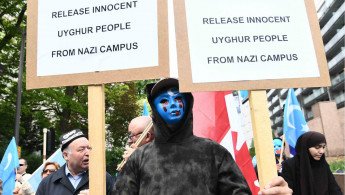China rolls out PR push over mass internment of Uighur Muslims
Beijing has come under intense pressure over its use of "re-education" camps in the province, forcing Uighurs to eat pork, drink alcohol, renounce Islam and praise the Chinese state.
Up to one million ethnic Uighurs and other mostly Muslim Turkic minorities are believed to be held in such centres, according to estimates cited by a UN panel.
Former inmates have said they found themselves jailed for wearing long beards and face veils or sharing Islamic holiday greetings on social media.
Chinese authorities initially denied the existence of the "re-education" camps. But they have changed their tune as satellite imagery and documents issued by their own government have made that position untenable.
Twitter Post
|
In a rare interview published on Tuesday, the chairman of Xinjiang's government, Shohrat Zakir, defended the use of the centres and said the region was now "safe and stable".
He said the "free" programmes were limited in duration, "trainees" signed a contract with the centres that laid out a clear plan of study and included a stipend.
But large numbers of families who left China say their relatives in Xinjiang were spirited away by police never to be heard from again.
The Chinese government has cracked down on the Xinjiang region for years, especially since a deadly anti-government riot broke out in the regional capital of Urumqi in 2009.
The brutal tactics pursued by Beijing in Xinjiang province include sweeping surveillance and DNA collection from millions that is fed to AI to rate people's loyalty to the state.
The roughly 10 million Uighurs make up a tiny proportion of China's almost 1.4 billion people and experts say they pose no threat to the state. Residents in the far-west province say Beijing's tactics are instead aimed at cultural genocide.
Follow us on Twitter: @The_NewArab





 Follow the Middle East's top stories in English at The New Arab on Google News
Follow the Middle East's top stories in English at The New Arab on Google News
![Israeli forces ordered bombed Gaza's Jabalia, ordering residents to leave [Getty]](/sites/default/files/styles/image_330x185/public/2176418030.jpeg?h=a5f2f23a&itok=_YGZaP1z)

